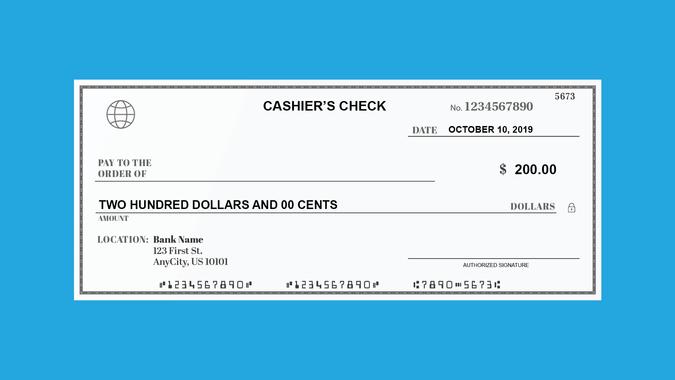What Is a Cashier’s Check and Where Can I Buy One?

What Is a Cashier’s Check?
A cashier’s check is an official check written and guaranteed by a bank. The person purchasing the cashier’s check pays the bank for the check. The bank then writes the check out to the designated payee.

Benefits of Using a Cashier’s Check
Only the designated payee can cash the check, making them a very secure method of payment.
Typically provides a quicker payout.
Funds are backed by a bank, so the check won’t bounce.
What If I Lose a Cashier’s Check?
If you happen to lose a cashier’s check, you might think you can ask the bank that issued it to place a “stop payment” order. Unfortunately, because the check is drawn on the bank that issued the check — not from your account funds — the bank generally must pay the check once it’s presented. However, you still need to notify the issuing bank if your lose a cashier’s check.
Additionally, if you want the bank to issue a new cashier’s check, the bank will require you to purchase an indemnity bond for the same amount of the lost check before it will issue you a new cashier’s check. An indemnity bond ensures that you will be liable for any losses that occur — instead of the bank — if the original cashier’s check is presented for payment. Some insurance companies sell indemnity bonds, but they can be difficult to obtain. Plus, after purchasing an indemnity bond, you might still have to wait up to 90 days before the bank will issue a replacement cashier’s check.
When To Use a Cashier’s Check
Cashier’s checks are the preferred method of payment for many people when a large sum of money is involved. This is typically at least $1,000, but some organizations may require a cashier’s check for anything valued at more than a few hundred dollars.
Many organizations prefer a cashier’s check because it’s a safer payment method since the funds are guaranteed. That means that they don’t have to worry about counterfeit or bounced checks after they have released a purchase to the buyer.
Some common situations that require a cashier’s check include:
Putting a down payment toward a new vehicle or boat.
Providing a security deposit for an apartment rental.
Making a real estate purchase.
Other companies require a cashier’s check if they need funds to settle quickly. This is common when working with brokerage firms.
Even if a company doesn’t require a cashier’s check, there are times it can still benefit you to use one, like making a rent payment quickly to avoid eviction or late fees, for example. If you need to pay something quickly or just want a more secure method of payment, a cashier’s check is the way to go.
Cashier’s Check vs. Money Order
Money orders are another commonly accepted method of payment, and the term is often used interchangeably with cashier’s checks. However, they are different things.
With a money order, the buyer prepays the total amount in exchange for a small piece of paper. It can be given to the payee, who can then deposit it into their account. In this manner, a money order is similar to a cashier’s check.
A money order differs from a cashier’s check in that:
There’s a limit to the amount of each money order, which is typically $1,000. So if you need $2,000 in money orders, you have to purchase several and pay a separate fee for each one.
The buyer fills out the money order instead of the bank.
Money orders are not backed by a bank, and they can take longer to settle.
Money Order Benefits vs. Cashier’s Check Benefits
Money orders can be useful in some cases, especially if you are sending a small amount of cash. The fees are often lower than some cashier’s checks, so as long as you are not buying multiple, you can save a little money.
Additionally, you don’t need to have a checking account to purchase a money order. You only need cash or a prepaid card.
While some banks allow you to get a cashier’s check without an account, most don’t. Therefore, if you don’t have a checking account, a money order may be an easier option.
Both money orders and cashier’s checks provide advantages and disadvantages. Choosing between the two will come down to any requirements you must meet and your fees.
How Much Does a Cashiers Check Cost?
Fees differ across financial institutions.
Bank Name | Fee | Fees Waived? |
|---|---|---|
$10 | Free for Premier Plus, Secure and Sapphire Checking | |
$15 | Fee waived for Preferred Rewards | |
$10 | Fee waived for Citi Priority Account Package and Citigold® Account Package | |
$10 | Free for military customers who have a U.S. Bank Smartly Checking Account | |
$5 – $10 | Fee-free for Performance Select Checking® and Foundation Checking® | |
$8 | N/A | |
Two free cashier’s checks for members each day; Additional checks are $5 each | N/A | |
$0 | N/A | |
$8 | Fee waived for Beyond Checking, 60 Plus Checking, Signature Savings, Private Tiered Checking and Private Tiered Savings | |
$10 | N/A |
How Can I Avoid Cashier’s Check Fraud?
To avoid cashier’s check fraud, it can help to know about common scams such as the following:
Work-at-home scam: Scammers “hire” someone to work from home as a check processor. The processor unknowingly receives fake cashier’s checks and is instructed to deposit them into his or her account and then forward the money to a third party.
Rental property scam: A out-of-state scammer contacts you and asks to rent your property, claiming he is in the process of moving to start a new job. He sends you the first and last month’s rent and a security deposit in the form of a fraudulent cashier’s check. Soon after you’ve received the funds, the scammer calls and says the job fell through and he won’t be moving after all. He says you can keep the security deposit but asks you to refund the first and last month’s rent. You do so and later find out the cashier’s check was no good.
Mystery shopping scam: You’re hired as a mystery shopper. As part of the job, you receive a cashier’s check to deposit in your account. You are instructed by the scammer to use part of the funds to purchase goods or services that need to be reviewed as part of your mystery shopping job. You’re also instructed to take a portion of the funds as your payment for your mystery shopping duties and send the remainder of the funds to a third party. Unfortunately, once the check is returned unpaid, you’ll be out the funds you spent to buy the goods or services and the money you sent to the third party. Plus, you won’t have received payment for the time you spend completing mystery shopping duties.
Unfortunately, after you deposit a cashier’s check, it can take weeks to discover that it is fraudulent, such as when the check returns unpaid by the “issuing” bank. Once this happens, your bank will likely reverse the amount of the deposit from the fraudulent cashier’s check and hold you liable for the funds. Here are some tips to avoid cashier’s check fraud.
Use caution when accepting a cashier’s check from someone you don’t know.
Contact the financial institution that the cashier’s check was issued from to find out if it’s valid. Do your own research to find contact information; don’t rely on the phone number printed on the check.
Never accept a cashier’s check that’s written for more than the amount you asked for.
Ask your bank when funds from the check will be made available to you and consider not spending any of those funds until the check has fully cleared.
Final Take
Here’s a quick recap of how to get a cashier’s check.
Cashier's Check FAQ
What is a cashier's check and how does it work?
A cashier's check is an official check written and guaranteed by a bank. The person purchasing the cashier's check pays the bank for the check. The bank then writes the check out to the designated payee.
Is a cashier's check the same as a cash?
No, a cashier's check is an official check written and guaranteed by a bank. They are typically used when a large sum of money is involved.
Cynthia Measom contributed to the reporting for this article.
Information is accurate as of Nov. 22, 2022.
This article originally appeared on GOBankingRates.com: What Is a Cashier’s Check and Where Can I Buy One?
